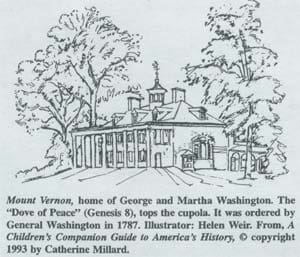
GEORGE WASHINGTON
Churchman, Vestryman, Warden
George Washington's diary entry of May 13, 1770 reads: "Went to Church with all the Compy. Here. Dind at Belvoir and returned in the Afternn." Pohick, the parish church of Mount Vernon, was completed in 1774. It stands as a living testimony to Washington, who was a reghular attendant. The original edifice, with Washington's pew (no. 28) nearest the communion rail, is still in continuous use. The first President was on the building committee of his church with George Mason of Gunston Hall.
Truro Parish, of which Pohick is the principal church, was formed in 1732. Augustine Washington, father of George, was a member of its vestry during his period of residence at Little Hunting Creek, (later named Mount Vernon, after Admiral Vernon, by Lawrence Washington). Washington was a vestryman of Truro Parish from 1762 until 1784. The vestries of these colonial parishes shared responsibility for "the maintenance of religion and all things pertaining thereto in the domain of charity and morals." >From time to time, Washington was an "overseer of the poor" for the parish and county.
George Washington attended church regularly throughout his life, while at home and during his long absences. He attended Pohick Church most frequently, although he also purchased a pew at Christ Church, Alexandria, built in 1773.
General Washington's career and writings manifest a deep and abiding faith; Christianity was a guiding influence in his life, public and private. This influence is displayed in the closing sentence of his valedictory letter to the governors of the states, written as he prepared to relinquish command of the Continental Army:
| "I now make it my earnest prayer, that God would have you, and the State over which you preside, in his holy protection, that He would incline the hearts of the citizens to cultivate a spirit of subordination and obedience to government, to entertain a brotherly affection and love for one another, for their fellow citizens of the United States at large, and particularly for their brethren who have served in the field, and finally, that He would most graciously be pleased to dispose us all, to do justice, to love mercy, and to demean ourselves with that charity, humility and pacific temper of mind, which were the characteristicks of the Divine Author of our blessed religion, and without an humble imitation of whose example in these things, we can never hope to be a happy nation." |
GEORGE WASHINGTON
First in war, first in peace, and first in the hearts
of his countrymen, he was second to none in the
humble and endearing scenes of private life.
- Henry Lee, December 26, 1799
A Brief Washington - Mount Vernon Chronology
1674 John Washington, great grandfather of George, patents the Mount Vernon homesite.
1726 Augustine Washington, father of George, acquires Mount Vernon from his sister Mildred.
1732-1735 George, first child of Augustine and Mary (Ball) Washington, born at the family home on the Potomac River in Westmoreland County, Virginia.
1735-1738 Augustine Washington in residence at Mount Vernon with his young family.
1743 Augustine Washington dies. Lawrence Washington, George's elder half brother, marries and settles at Mount Vernon.
1752 Lawrence Washington dies at Mount Vernon.
1754 George Washington acquires Mount Vernon by release from Lawrence Washington's widow.

1759 Marries Martha Dandridge Custis, widow of Daniel Parke Custis, and settles at Mount Vernon with his wife and two young stepchildren, John Parke and Martha "Patsy" Parke Custis.
Tribute of a fellow countrywoman:
"Martha Washington was a remarkable woman. Suddenly placed in a position of eminence, she was so well poised that she never challenged criticism, nor called forth the darts of envy."
1775 Elected General to command all Continental forces. Washington writes to his wife from Philadelphia:
"I should enjoy more real happiness in one month with you at home than I have the most distant prospect of finding abroad if my stay were to be seven times seven years."
1781 Stops briefly at Mount Vernon en route to and from Yorktown. John Parke Custis dies at the siege of Yorktown; Washington adopts his two youngest children, Eleanor "Nellie" Parke and George Washington Parke Custis.
1783 Resigns his commission to Congress and retires to Mount Vernon.
1787 Presides over the Constitutional Convention in Philadelphia.
1789-1797 Years of the Presidency. Visits Mount Vernon fifteen times.
1799 George Washington dies and is buried in the old family vault.
1802 Martha Washington dies and is buried beside her husband. Mount Vernon passes to Washington's nephew, Bushrod Washington.
1829 Bushrod Washington dies, leaving Mount Vernon to his nephew, John Augustine Washington.
1858 Ann Pamela Cunningham purchases Mount Vernon from John A. Washington, Jr., and founds the Mount Vernon Ladies' Association. "Mount Vernon shall be forever held by it sacred to the Father of his Country." (Virginia Charter of the Association.)
1854 Ann Pamela Cunningham delivers her farewell address, as founder and first Regent of the Mount Vernon Ladies' Association:
"Ladies, the home of Washington is in your charge - see to it that you keep it the home of Washington...Those who go to the home in which he lived and died wish to see in what he lived and died...Upon you rests this duty."
(Copyright 2002 by Christian Heritage Ministries![]() )
)

